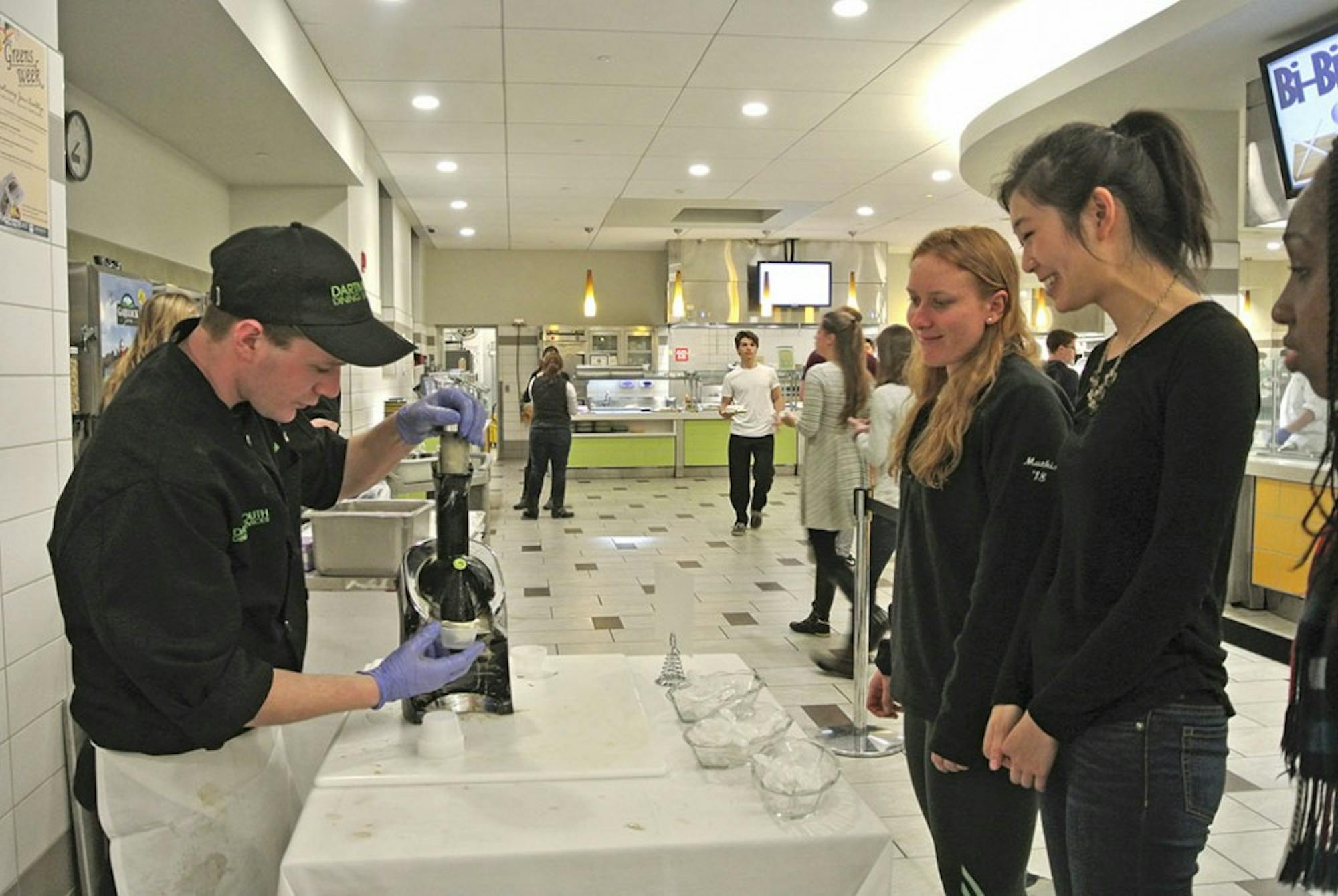New York Times best-selling cookbook author Jane Esselstyn describes her cooking style as “plant-based, baby!” Esselstyn came to Dartmouth this week to discuss this style for what Dartmouth Dining Services has dubbed “Greens Week,” showcasing plant-based diets around the College.
Many of Esselstyn’s recipes were featured in Dartmouth’s Class of 1953 Commons dining hall for the week, including lemon-ginger tofu cubes, polenta cakes and vegan waffles. Additionally, Esselstyn delivered a public talk on Wednesday afternoon called “Benefits of A Plant Based Diet, Dispelling Common Myths Of Plant Based Eating.” She also gave a cooking demonstration alongside a cookbook raffle yesterday.
College staff dietician Beth Rosenberger said that Greens Week was an important step in helping people make better decisions about what they eat.
“Greens Week has certainly, we hope, raised awareness about a plant based diet,” Rosenberger said. “Not only that, but, with all this wonderful food, people have been able to sample and try and see that it is not scary and weird.”
She noted that the biggest barrier to a healthier diet for most people is a lack of knowledge about food and nutrition. The newfound independence of college students combined with the large variety of food immediately available to them in dining halls often creates uncertainty in how to monitor their eating habits, she said.
Esselstyn concurred, adding that misconceptions about a plant-based diet, such as seeing it as a diet of deprivation, often prevent people from making the transition.
Rosenberger said that bringing in Esselstyn will allow DDS to offer more choices and variety to students, as her recipes are easy to prepare. Many of these recipes will be incorporated into the summer menu for DDS, and even more will be added in the fall, she said.
Recently, DDS has added food items including kombucha and Suja health-oriented juice drinks to campus dining locations such as the Courtyard Café at the Hopkins Center. Rosenberger said that these drinks were added because DDS recognizes that they need to change up students’ options. Suja was brought in after the vendor, Odwalla, suggested the addition. Kombucha was added in an effort to add healthier options to the Courtyard Café.
Angela Zhang ’19 said that while she loves the addition of kombucha to College dining offerings due to its taste and benefits, she believes it is overpriced.
“We want to offer healthy options and different options, not just soda and Vitamin Water,” Rosenberger said, “All the managers in all the outlets are always looking for new and different options.”
Eating healthy leads to a healthy body and thus a decreased risk for disease, she said.
Esselstyn said that her cooking style came out of the necessity to prevent heart disease and other potential health problems. She learned how to cook at home, a skill she described as much needed after becoming a mother of three.
Esselstyn was initially contacted by DDS associate director Don Reed to come to the College. She decided to accept the offer because she liked that DDS was so interested in providing healthy options for its students, and was excited to have the opportunity to help students form lifelong healthy eating habits.
“I saw this big, strong athletic-looking young man take one of the polenta stacks, and I was so pleased to see him select it,” she said.
The biggest misconception about her style of cooking is that it is difficult, Esselstyn said.
She said her decision to focus on a plant-based diet was inspired by her father.
Reed said he chose the recipes that would be featured in the dining halls alongside Greens Week’s programming. Many of the recipes are different from standard dining options as they do not use oil, Reed said.
He said he contacted Esselstyn after overhearing a conversation about her, and decided that she would be a great option for the guest chef he was looking to invite to the College.
A key factor in selecting a guest chef was making sure that their food was appealing to a student demographic, Reed said.
Additionally, as sustainability and health concerns continue to increase, plant-based diets will also become more popular, Reed said.
“If we can be ahead of the curve and get better at preparing our vegetarian and vegan options, it is better for everybody,” he said. “We are still going to have our regular items such as french fries and chicken nuggets, none of those are going away, but we need to offer the choices to those who want options,” he said.
Previously, DDS will continue to look for other guest chefs to invite and run similar programming, Reed added. He is currently looking into potential guest chefs specializing in Latin-American cuisine.
DDS also brought in cookbook author Beth Dooley in March of 2012 and James Beard Award winner and wok-expert Grace Young in April 2012, who helped form the stir-fry stations in ’53 Commons.




